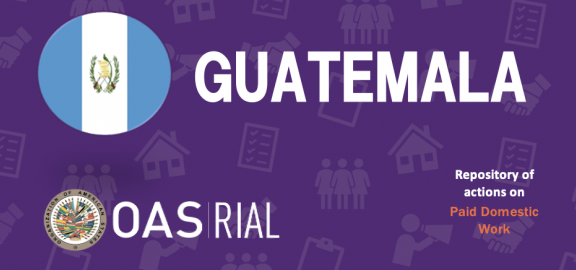Guatemala - Repository of Actions on Paid Domestic Work
| Regulatory Information | |
| Ratification of the 189 ILO Convention | No. |
| Existence of an internal regulation for domestic work |
Yes.
Agreement 1235, Regulation of the special protection program for domestic workers – PRECAPI. Consult here.
Guatemalan Labor Code, Decree 1441. Consult here.
There is a Project Law 4981 with a favorable opinion that recommends the approval of the Convention on decent work for domestic workers, number 189 of the ILO. |
| Areas of Intervention | |
| 1. Training and professionalization |
Workers:
The institutions in charge of this function are: Education and Training for Employment, General Directorate of Employment and Ministry of Labor and Social Welfare.
TECHNICAL TRAINING PROGRAM FOR EMPLOYMENT - SECAFOR-
Employers:
The Ministry does not seem to have trainings for employers of domestic workers at this time.
|
| 2. Dissemination and awareness-raising |
The section for Working Women provides comprehensive care to working women in private homes, which consists of orientation, advice, support and training in labor matters. In some cases, interpreters have been required when the material is monolingual, women are also given the necessary time to ensure their understanding of the complaint process, the application of regulations, in some cases they are illiterate, therefore they are given support to be able to fill out applications or tickets for access to the services provided by the Ministry.
Most recurring cases attended:
|
| 3. Inspection |
Training has been carried out on “Awareness-raising and incorporation of the gender perspective in the work of labor inspection in Guatemala”:
In the Working Woman section, particular attention is given to domestic workers, providing support since Guatemala is a country with many cultures and languages (24 Mayan languages).
In most cases, domestic workers belong to a cultural identity. Accompaniment is provided in the section, and when the women are monolingual, inter-institutional support is provided with translators for a precise understanding of the processes regarding labor inspection. |
| 4. Social Security Coverage | The Guatemalan Social Security Institute (IGSS) has a Special Protection Program for Domestic Workers (PRECAPI) where employers are given the responsibility of registering their domestic workers so that they can access social security services. Consult here. |
| 5. Alliances with social actors |
There is a strategic alliance with women’s organizations, including the Association of Domestic, Home, and Maquila Workers (ATRAHDOM) and SITRADOMSA. These two organizations bring together domestic workers and talks, and work meetings have been held to guarantee respect for the labor rights of domestic workers, the Special Protection for Domestic Workers - PRECAPI – has been addressed at these meetings, which is provided by the Guatemalan Social Security Institute.
A training work plan has been carried out for women domestic workers and leaders of local groups, establishing a participatory methodology according to the social context of the participants focusing on three departments: Huehuetenango, San Marcos, and Quetzaltenango, with the presence of participants from Quiche and Totonicapán, in coordination with the Association of Domestic, Home, and Maquila Workers (ATRAHDOM). |
| More information | |
|
In 2022, a request for support was made to the ILO to strengthen the Directorates of the Vice Ministry of Labor Administration, which was accepted. Derived from this, in February 2023, a virtual exchange of experiences was held with Costa Rica and Panama; who shared what their experiences has been like to incorporate the gender perspective in inspection work.
In February 2023, a group of labor inspectors traveled to Spain to participate in an exchange of good practices for the strengthening of the General Labor Inspectorate with the Ministry of Labor and Economy of Spain, focused on gender issues, including inspection work with a gender perspective. |
|
*Information reviewed and approved by the Ministry.




